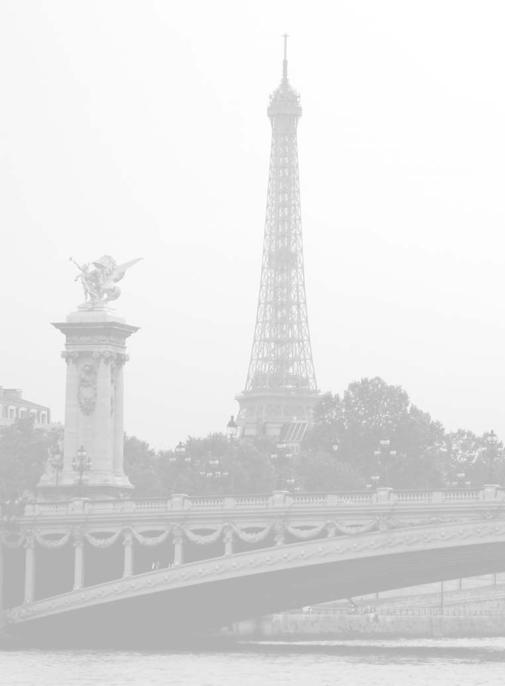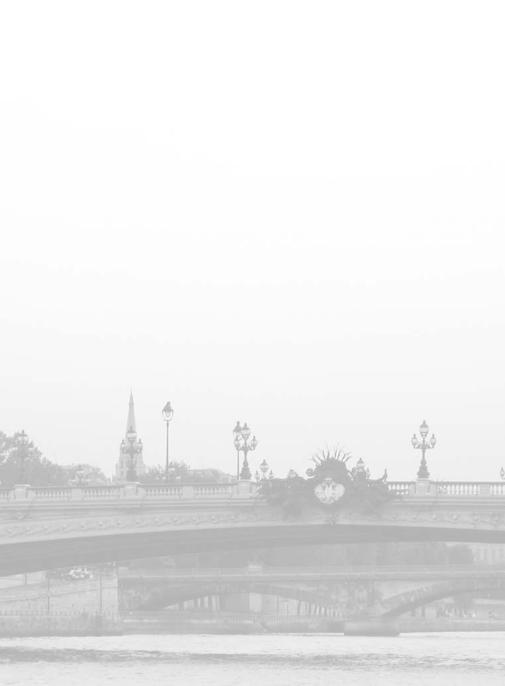April in Paris


This book has been optimized for viewing
at a monitor setting of 1024 x 768 pixels.
April
in
Paris



April
in
Paris
Michael Wallner
Translated from the German
by John Cullen
a n c h o r b o o k s
A Division of Random House, Inc.
New York
FIRST ANCHOR BOOKS EDITION, MARCH 2008
Copyright © 2006 by Luchterhand Literaturverlag, a division of Verlagsgruppe Random House GmbH. International Rights Management: Susanna Lea Associates, Paris.
English translation copyright © 2007 by John Cullen All rights reserved. Published in the United States by Anchor Books, a division of Random House, Inc., New York, and in Canada by Random House of Canada Limited, Toronto. Originally published in hardcover in the United States by Doubleday, a division of Random House, Inc., New York, in 2006.
Anchor Books and colophon are registered trademarks of Random House, Inc.
This book is a work of fiction. Names, characters, businesses, organizations, places, events, and incidents either are the product of the author’s imagination or are used fictitiously. Any resemblance to actual persons, living or dead, events, or locales is entirely coincidental.
April in Paris
by Michael Wallner was first published in 2006 under the title
April in Paris
by Luchterhand Literaturverlag, an imprint of Verlagsgruppe Random House GmbH.
Library of Congress Cataloging-in-Publication Data
Wallner, Michael, 1958–
[April in Paris. English]
April in Paris / Michael Wallner ; translated from the German by John Cullen. —1st ed.
p. cm.
1. Paris (France)—History—1940–1944—Fiction. 2. World War, 1939–1945—France—
Paris—Fiction. 3. World War, 1939–1945—Underground movements—France—Paris—
Fiction. I. Cullen, John. II. Title.
PT2685.A4742A66713 2006
833’.92—dc22
eISBN: 978-0-307-38952-7
v1.0
For John and Martha Wallner

Pont
Royal,
1
Ilearned about the transfer before noon. The small stripes of light had reached the windowsill. My major came in and kept one hand on the doorknob while gesturing to me with the other to keep my seat. He wanted to know if the hogwash from Marseille was ready yet. I pointed to the half-written sheet still in the typewriter. I could go when I reached the end of the page, he said.
“And the dispatch from Lagny-sur-Marne?” I asked, surprised.
“Someone else will have to do it. You’re needed elsewhere.”
I pressed my knees together under the table. In those days, many people were being sent to the front.
“I’m being reassigned?”
“Rue des Saussaies has lost a translator.” The major ran his hand down the left side of his uniform coat. German Horseman’s Badge, War Merit Cross. He said he’d do all he could to get me 4 . M I C H A E L W A L L N E R
back. I shouldn’t worry, he said; my transfer would be only temporary.
“What happened to the translator from rue des Saussaies?”
“He was run over and killed last night.”
I flinched. “Partisans?”
“Of course not. The guy was drunk, and he went staggering over a bridge. Because of the blackout, the patrol car saw him too late. Unfortunately, he didn’t die right away. Horrible. Anyway, the request for an interpreter wound up on my desk. You seem to have a
reputation
in rue des Saussaies,” the major said with a rare smile. “They specifically asked for
you.
”
My back stiffened. I glanced across the room toward the wall map, scale 1:500,000. Arrows, hatching, the plaster rosette over the door, the remains of cloth wallpaper from the time when people still
lived
here. My desk, the French dictionary, badly chewed pencils. I was going to miss the lovely view out over the line of roofs to the west.
The major looked at me gloomily. “Finish the Marseille thing.
Then take the rest of the day off. You start over there tomorrow morning. You’ll be back in a few days. Those folks aren’t particularly fond of strange faces.”
I stood up and saluted; the major absentmindedly raised his arm. I remained standing even after he left the room. The sunlight came through the window and cast a shadow like a cross on the wall. All at once, I was cold. I buttoned my top button and grabbed my cap, as though I was about to leave. Then I put it down again, lowered myself onto the chair, read the French original, and began typing the translation with two fingers.
A P R I L I N P A R I S .
You could have gone another way, I said to myself. How careless, to walk down rue des Saussaies, of all streets. The black-and-silver uniform appeared quite suddenly, right in front of SS
headquarters. A brief exchange of words. Did he ask for a light?
You’d better be careful. Only translate expressions from the dictionary. Stare at the table. Never look anyone in the face. Forget whatever they let you see. In the evening, you’ll go to your hotel; in the morning, you’ll report for duty on time. Until they don’t need you anymore. Then you’ll go back to your major, who doesn’t want to do anything but enjoy the city and relish the role of the conqueror and leaves it to you to push arrows and numbers around and adorns your reports with his name. As long as you remain indispensable, he’ll keep them from sending you into the real war.
The Pont Royal was standing in water up to its shoulders, only half a meter shy of the high-water mark set in 1700 and something. Fishermen leaned over the parapet wall. The stones were already warm, and people were sitting around with half-closed eyes, facing the sun. When they heard the hobnailed boots approaching, some turned away. I plunged into the hubbub of the Latin Quarter. The more people there were, the less conspicuously foreign I was. The waters of the Seine raged in the steel framework of the Pont Solférino. A stout Oriental woman at a produce stand picked up three miserable apples and felt them, one after another.
Not far away, a private first class and his comrade stood gawking at her. A silver half-moon glistened on her forehead.
6 . M I C H A E L WA L L N E R
“Great-looking women they’ve got here,” said the private first class.
The other nodded. “I’d be willing to sully the Aryan race with a bit of that.”
Despite her corpulence, she was elegant, but she behaved as though she had no right to be on the street. When the owner of the shop came out and glared at her suspiciously, she put the apples back. After a few uncertain steps, she noticed the soldiers, who were standing in her way with grins fixed on their faces.
I stepped behind the field gray uniforms and ducked into a narrow side street. I was walking uncomfortably fast, setting a blistering pace, in fact, when what I actually wanted to do was stroll. I counted the hotel signs as they glided past overhead. Go into one, I thought, ask for a room on the top floor. Take off your boots—easy does it—open the floor-to-ceiling window, and let time slip motionlessly by.
I slowed my pace. The shop across the street was several rooms deep. Back in the farthest room, a lightbulb was burning. I crossed the street. In front of the entrance, there was a stack of chairs with pink coverings. I bent down and touched the splitting silk. Someone in the rear of the shop raised his head. The light made his face stand out sharply against the shadowy background. When he looked at me, I straightened up quickly, as if I’d been caught doing something forbidden.
I looked for wider streets, more people, more of a crush. Most of the shops were already closed, empty behind reddish brown metal bars, offering nothing to the hurrying passersby. A bakery was still open, though the line was long. I joined it, avoiding people’s eyes. They kept their distance from the uniform. I bought a A P R I L I N P A R I S .
loaf of flour-sprinkled bread. As I stepped out, a garçon was sweeping up wood shavings from the sidewalk.
I passed a black gate I’d seen before without ever noticing that it led not into a building but into a narrow street, practically an alley. I drew myself up to decipher the faded street sign. Rue de Gaspard? The gate was shut. Although I was curious, I hesitated.
Then I leaned on the gate, and one of its panels gave way. Passing pedestrians scrutinized me as I stood there like that, half in the street, half in the entrance. I looked past the iron threshold.
The little street disappeared in the shadow of a wall. Gray light on the pavement. I slipped through the gate and set off down the alley. Closed shutters everywhere. Where the buildings were lowest, the evening sun shone through.
When I turned the corner, I came upon a junk dealer who was carrying his wares back into his shop. With a bronze bust in his arms, he blocked my way, unintimidated by my uniform. I noticed a pendulum clock leaning against the wall. Walnut housing, polished brass pendulum.
I said,
“Il me semble que j’ai vu exactement la même à Munich.”
My unaccented French surprised him.
“C’est possible, monsieur.